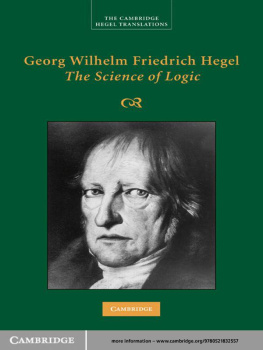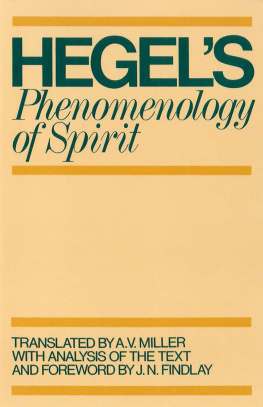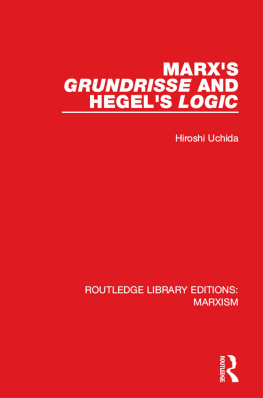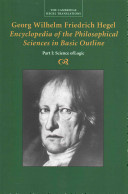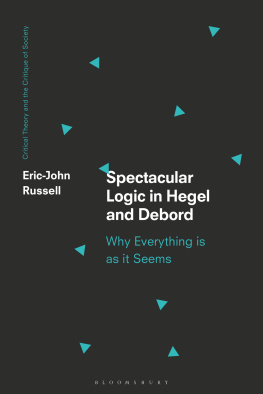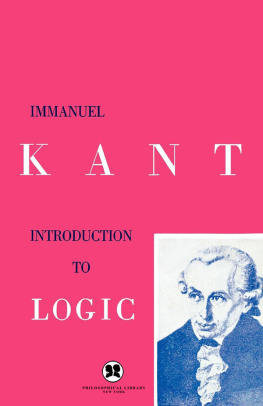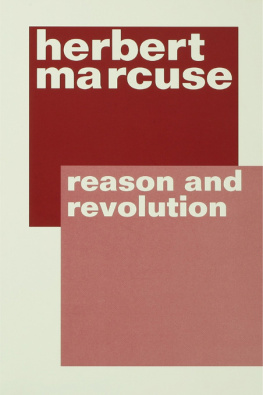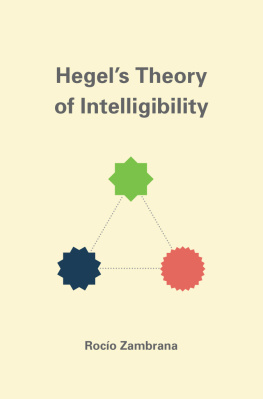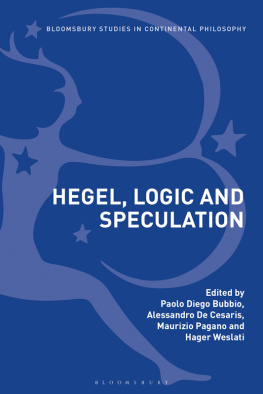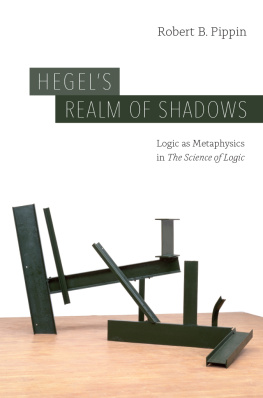Georg Wilhelm Friedrich Hegel
The Science of Logic
The purpose of the Cambridge Hegel Translations is to offer translations of the best modern German editions of Hegel's work in a uniform format suitable for Hegel scholars, together with philosophical introductions and full editorial apparatus.
This new translation of The Science of Logic by G. W. F. Hegel (also known as his Greater Logic ) includes Book One (revised 1832), Book Two (1813) of Volume One, and Volume Two (1816). Recent research has given us a detailed picture of the process that led Hegel to his final conception of the System of Philosophy and of the place of the Logic within it. We now understand how and why Hegel distanced himself from Schelling, how radical this break with his early mentor was, and to what extent it entailed a return (but with a difference) to Fichte and Kant. In the introduction to the volume, George di Giovanni presents in synoptic form the results of recent scholarship on the subject, and, while recognizing the fault lines in Hegel's System that allow opposite interpretations, argues that the Logic marks the end of classical metaphysics. The translation is accompanied by a full apparatus of historical and explanatory notes.
GEORGE DI GIOVANNI is Professor of Philosophy at McGill University, Montreal. His previous publications include Freedom and Religion in Kant and his Immediate Successors: The Vocation of Humankind , 17741800 (Cambridge, 2005), Between Kant and Hegel: Texts in the Development of Post-Kantian Idealism (2000), and The Cambridge Edition of the Works of Immanuel Kant , Vol VI: Religion and Rational Theology (Cambridge, 1996).
CAMBRIDGE HEGEL TRANSLATIONS
General editor:
Michael Baur
Heidelberg Writings: Journal Publications
Edited and translated by Brady Bowman and Allen Speight
The Science of Logic
Edited and translated by George di Giovanni
Georg Wilhelm Friedrich Hegel
The Science of Logic
Translated and edited by
George di Giovanni
McGill University
CAMBRIDGE UNIVERSITY PRESS
Cambridge, New York, Melbourne, Madrid, Cape Town, Singapore, So Paulo, Delhi, Dubai, Tokyo, Mexico City
Cambridge University Press
The Edinburgh Building, Cambridge CB2 8RU, UK
Published in the United States of America by Cambridge University Press, New York
www.cambridge.org
Information on this title: www.cambridge.org/9780521832557
George di Giovanni 2010
This publication is in copyright. Subject to statutory exception and to the provisions of relevant collective licensing agreements, no reproduction of any part may take place without the written permission of Cambridge University Press.
First published in print format 2010
ISBN 978-0-511-78651-8 mobipocket
ISBN 978-0-511-78765-2 eBook (Kindle edition)
ISBN 978-0-521-83255-7 hardback
Cambridge University Press has no responsibility for the persistence or accuracy of URLs for external or third-party internet websites referred to in this publication, and does not guarantee that any content on such websites is, or will remain, accurate or appropriate.
IN MEMORIAM
HENRY SILTON HARRIS
late fellow of the Royal Canadian Academy of the Humanities
scholar, philosopher, humanist, mentor, friend
m'insegnavate come l'uom s'etterna :
e quant'io l'abbia in grado mentr'io vivo
convien che ne la mia lingua si scerna .
Inferno XV, 8587
Contents
Acknowledgments
I wish to thank John Burbidge, Marina Bykova, David Carlson, and Angelica Nuzzo, all of whom read an earlier draft of my introductory essay and made invaluable suggestions and occasional corrections. To David Carlson I owe special thanks for having saved me from some egregious errors. I am grateful to Cinzia Ferrini for having alerted me to the significance of otherwise unobtrusive changes in the 1832 edition of Hegel's text, and must also acknowledge the debt that I owe to Antonio Moretto's studies on Hegel and the mathematics of the infinite. These studies have provided important historical background for Hegel's discussion of calculus that I would have otherwise missed. I thank Michael Baur, the editor of the series, for many suggestions and corrections. How much indebted I am to the scholarly labours of the late H. S. Harris should be evident from my notes. This translation is dedicated to his memory.
I wish to thank Anna Ezekiel, McGill doctoral student, for her much-needed help in shaping an unwieldy script into presentable form and for her truly heroic bibliographical work. Most of all, I thank Dr. Pierre Chetelat, at one time doctoral student at McGill and my research assistant for the past three years, for the care with which he read over the text of the translation at various stages of production and made numerous suggestions for improving style. Together with Anna, he also contributed to the composition of many of the notes. He is solely responsible for the Index. I consider myself fortunate to have had such capable collaborators.
I am of course responsible for any errors.
The research associated with this work was made possible by a grant from the Social Sciences and Humanities Research Council of Canada (Grant Code: G206217) and further subsidized by the Fonds de recherche sur la socit et la culture (Quebec). Meiner Verlag graciously gave permission to enter in the margins the pagination of their critical edition.
George Di Giovanni
Abbreviations
| A /B = | Immanuel Kant, Critique of Pure Reason , cited according to the pagination of the 1781 and 1782 editions (A and B). |
| AK = | Immanuel Kant. Gesammelte Schriften , ed. Royal Prussian Academy of the Sciences (Berlin: Reimer, 1902), cited by volume and page number. |
| GA = | J. G. Fichte Gesamtausgabe der bayerischen Akademie der Wissenschaften , ed. R. Lauth and H. Gliwitzky (Stuttgart-Bad Cannstatt: Fromann-Holzboog, 19622005), cited by series number in Roman numerals, volume number, pagination, and when appropriate line number. |
| GW = | G. W. F. Hegel: Gesammelte Werke , Deutsche Forschungsgemainschaft (Hamburg: Meiner, 1968), cited by volume, page, and when appropriate line number. |
| Miller = | Hegel's Science of Logic , trans. A. V Miller (London: Allen & Unwin, 1969). |
| Moni/Cesa = | G. W. F. Hegel: Scienza della Logica , Vols. I and II, trans. Arturo Moni (192425); revised, Claudio Cesa (Roma-Bari: Laterza, 2001). |
| Guyer/Wood = | Critique of Pure Reason , trans. and ed. Paul Guyer and Allen Wood (Cambridge: Cambridge University Press, 1998). |
Introduction
Prologue
Writing an introduction to a translation of Hegel's Logic is an even more formidable task than the translation itself. There are serious issues that immediately confront the author, and it will not be amiss to indicate them at the start, and also to declare how I have chosen to settle them. First, there is the issue of defining the task that an introduction should perform. An introduction cannot be a step-by-step guide for the neophyte across the intricacies of the Logic. Fortunately, it need not be. There are already guides of this kind available, some classic, others more recent, all good in their different ways. An introduction may be a general statement about the project of the Logic, its place in Hegel's System, and the key concepts that govern the progression of the categories. But general statements of this kind, while of no use to those already in the know, do little in the way of indicating why the Logic is at least an interesting, and as I believe also still significant, philosophical product. It is not clear, in other words, whether such statements do any work at all. They certainly do nothing to motivate a reading of the Logic and may even simply reinforce well-established prejudices. For this reason, I have decided in this introduction to focus on the Logic's problematic nature as such. My claim is that the Logic is to be read as still in line with Kant's Transcendental Logic, though without being transcendental in Kant's sense. But once this determination is made, another issue immediately arises. Of course, however philosophically important the Logic might still be, the fact remains that it is a dated document. Why Hegel should ever have wanted to attempt it needs historical explanation. And this I have done with as much detail as space allowed. But the problem is that the moment one departs from a purely historical account and takes a definite stand on the nature of the Logic, one is immediately faced with a host of conflicting interpretations, both classic and recent, and, while one cannot enter in an introduction into an extended polemical debate with them, to ignore them would smack of dogmatism. I have tried to negotiate my way out of this dilemma by bringing out the fault lines in the Logic along which different and even contradictory readings are possible. I neither ignore nor dismiss these readings, even though I perforce refer to them globally. For the classic and more metaphysical of them there was no problem singling out J. M. E. McTaggart as the representative figure. But the state of the recent, in spirit more hermeneutic readings is still much too fluid for singling out any representative figure. Hence, although I shall mention the occasional name in footnotes, I shall refer to these more recent developments only in general, without emblematic representation. Between these two extremes, a host of more qualified readings are available in the literature. I hope that, by motivating a study of the Logic, I also motivate a study of all this literature.

